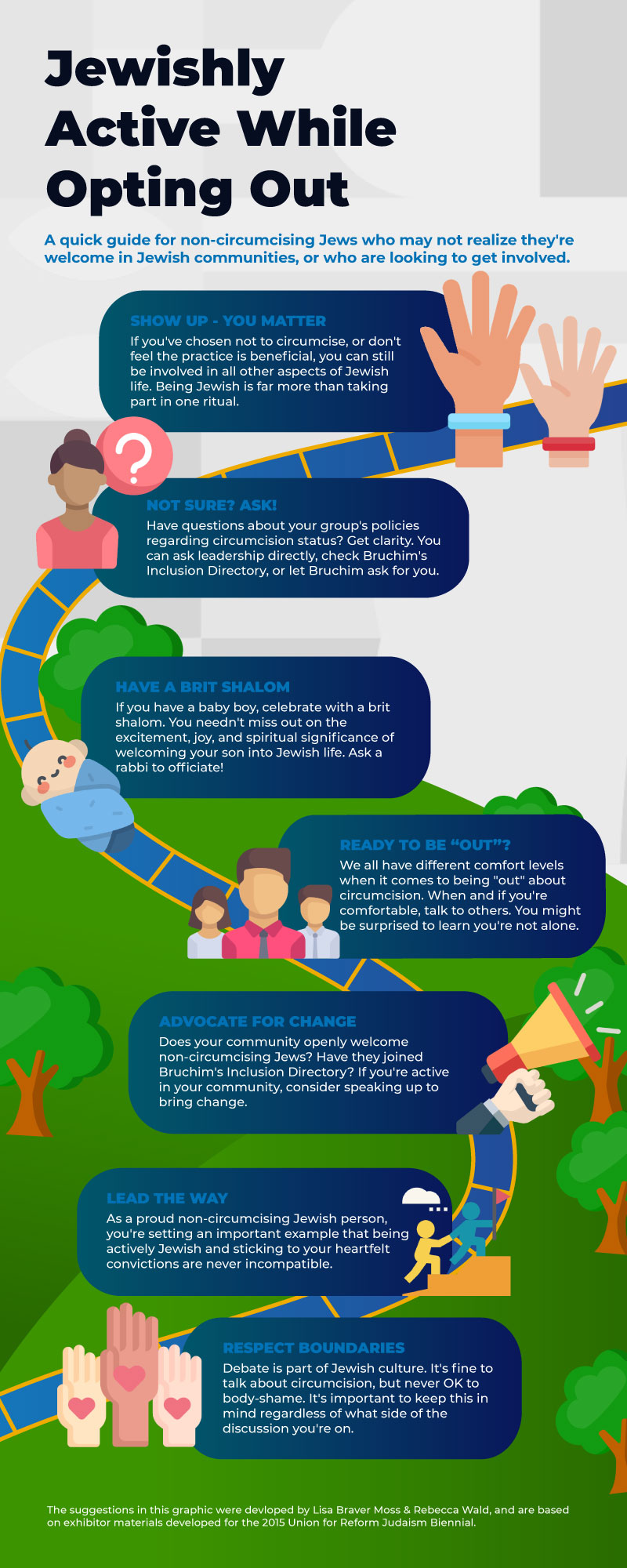Inclusion Directory FAQ
What institutions/people can sign up to be in Bruchim’s inclusion directory?
Any Jewish organization (including synagogues, Jewish community centers, schools, camps, college groups, advocacy organizations, etc.) may request to be included. Individual clergy can also be included, as well as others who regularly officiate at Jewish life cycle events. Inclusion in the directory indicates that circumcision status is never a barrier to involvement. Listed clergy are willing to perform a brit shalom ceremony. Click here to search or join the directory.
I notice my synagogue or Jewish group isn’t listed in the inclusion directory. Why?
Membership in our directory is by request. If your rabbi, synagogue, or Jewish group isn’t listed, it’s possible they’re not aware of Bruchim. It’s also possible they have chosen not to be included. Bruchim does not publicly disclose which institutions have specifically declined to be in our directory.
If I give Bruchim the name of my synagogue/Jewish group, can Bruchim contact them to see if they’d like to be added to the directory?
Absolutely. Click here to make your request.
Involvement FAQ
I’m interested in helping Bruchim. What can I do?
Consider making a one-time or recurring donation. Bruchim is an IRS-approved nonprofit and donations are fully tax-deductible. If your contribution exceeds $250, per IRS rules we will provide you with a written acknowledgment. Gifts to Bruchim are of critical importance as we get off the ground.
Add yourself to our email list and engage with our social media so you’ll know when opportunities to help Bruchim arise. Share, like and retweet our social media posts to let others know about us. Another way to further our mission is to approach the Jewish organizations you’re affiliated with and encourage them to check out our website. Tell them you’d like to see them listed in the directory.
Do you accept volunteers or interns, or offer paid positions?
Bruchim is an entirely volunteer-led nonprofit at this time. If you’re interested in playing a role, please consider joining Bruchim’s Chaverim. As a member, you’re invited to attend Bruchim’s general meetings, which take place on Zoom. Bruchim’s Chaverim is open to anyone who identifies as Jewish and supports Bruchim’s mission. Learn more.
New Language FAQ
What does the term “intact” mean?
The word “intact” is an alternative to saying “uncircumcised” or “not circumcised.” The prefixes “un” and “not” imply that circumcision is the normal or preferential state. Babies are born with intact (whole, unaltered) genitalia, so use of the term intact is descriptive and accurate. On our website, and in our materials, we use a number of descriptive terms interchangeably.
Why do you use the term “brit shalom” to refer to naming ceremonies for male infants who have not been circumcised?
To the best of our knowledge, the term brit shalom was coined by Rabbi Nathan Segal in the 1980s. Naming ceremonies for intact babies have gone by other names, including “brit ben” (covenant for a boy) and “brit b’lee milah” (covenant without circumcision). Brit shalom has taken hold as the most widely-used variant. Since the Hebrew word “shalom” is a greeting of welcome, and also means both “peace” and “wholeness,” the term “brit shalom” fits well.
Mission FAQ
Why should institutions go out of their way to welcome those who opt out of circumcision?
In the case of other ritual choices such as keeping kosher and observing Shabbat, individuals are not turned away, lectured, or asked to be “discreet” when they don’t participate. In the case of circumcision choice, lack of an explicit welcome goes hand-in-hand with widely followed “don’t ask/don’t tell” policies. Don’t ask/don’t tell is inherently anxiety-producing for the nonconforming party. An explicit welcome means a family needn’t fear being shamed or outed. Neither will they be left to guess whether they’re accepted and can participate.
Isn’t circumcision status a private matter? Why can’t non-circumcising Jews just be discreet about their choice?
While some non-circumcising Jews feel most comfortable being private about their choice, the fact is that traditional Jewish circumcision ceremonies aren’t a private matter. Brit milah is historically a community event and is therefore expected in many situations. Diaper changes and toileting in a preschool setting make it impossible to hide the intact status of young children. Older children talk to one another, and brit milah is typically discussed in the Jewish classroom. Bruchim advocates for the open inclusion of such children, without the need to hide their status.
The number of Jewish people who don’t follow the circumcision tradition must be small. Why should groups make the effort to reference and include such a small population?
Right now, we don’t know how many Jewish people are intact, how many parents plan to opt out, or how many parents want to opt out but don’t feel supported. It’s safe to say Jews opting out represent a minority. Regardless of the numbers, inclusion of any kind has never been about the majority. Inclusive and accessible spaces benefit everyone.


